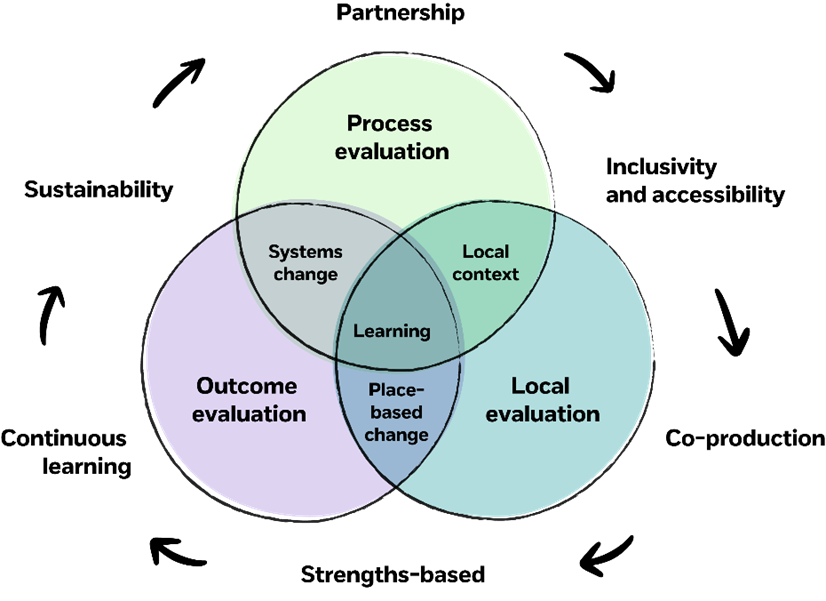Together for Childhood (TfC) is the NSPCC’s long-term project working across the UK in four towns and cities to make them safer for children.
Through place-based working, each TfC site – Glasgow, Grimsby, Plymouth and Stoke-on-Trent – aims to create a sustainable, joined-up approach to the prevention of child abuse. TfC promotes effective collaboration in communities to ensure that everyone plays their part to help keep children safe.
Evaluating a place-based approach to child abuse prevention
Evaluating place-based initiatives presents both opportunities and challenges. Research and evaluation actively contribute to the change process by focusing on real-time learning and accountability. However, evaluating these initiatives pose unique challenges. These include capturing long-term outcomes, attributing outcomes in complex and changing contexts and measuring change in areas such as participation, relationships and capacity building. The persistence of these challenges are set out in Smith et al’s 2023 review on Evaluating Place-Based Approaches.
In TfC we learn about what works and how the work we do makes a difference in three ways. Our process evaluation strand focuses on how TfC has been implemented and how a place-based approach is defined and characterised in abuse prevention. The outcomes evaluation aims to assess whether TfC has produced or contributed to the outcomes set out in our theories of change. Local evaluations describe what change looks like in each site and the path to achieving it. These intersecting approaches deepen our understanding of place-based, systems change in unique local contexts.

The intersection model.
Lessons learnt from five years of evaluation research
In developing and implementing our evaluation approach over the first five years of the 10-year timeline we have emerging lessons to share.
1 - Learning is informed by all our design principles
Our methods work best when underpinned by our design principles – these are circling the Venn diagram above. At the core of our approach is learning and improvement which reflects the iterative nature of the evaluation. The evaluation has as a result become a core tool for change and an integral part of TfC itself.
2 - Change is slow and long term
In place-based initiatives, changes can take a long time to be observed. Small changes can often be seen through evaluation, and it is important to celebrate them. The small changes build towards big changes and to capture this, being open to evolving the evaluation methodology in line with emerging local practice is key.
3 - Telling the story of change
In complex contexts, relying on quantitative data alone could mean missing important and unexpected findings. Focusing on the story of change, as we did in our Transformative Evaluation approach, allows us to see the process behind how a place-based approach works. By documenting these experiences, we can better understand the links between implementation and outcomes.
4 - Each place is unique
Our process evaluation findings show us that Together for Childhood is building on local assets and the existing strengths of local communities and partners. Each site has its own strengths and challenges that should be considered in context with the findings. The purpose of evaluation is not to compare, but understand. This is not to say that cross site learning is not important, because sharing findings can grow local responses. Dissemination at multiple levels of the system is crucial to drive sustainable change.
5 - Local embedded evaluations are central
Local evaluations, such as our Young Voices project and Practitioners in Schools pilot, play a central role in helping us articulate how a place-based approach works. Embedded evaluators make this possible. The role needs to be funded and effectively resourced, including in our case, support from a central research team. Embedded evaluators collect the evidence and knowledge needed for continuous learning, while navigating the insider researcher tension that arises through reflective practice.
At the midpoint of TfC, it is important to understand our journey so far and the outcomes that have been produced – whether intended or unintended. Our upcoming midline evaluation will use a methodology made up of participatory reflective practice workshops and outcomes harvesting. This will highlight what we have learnt so far, what makes TfC work, and what can be improved.
We will also evaluate our evaluation approach. For those interested, you can view our evaluation reports and find out more about TfC on NSPCC Learning.
A particular challenge we face moving forward is that within messy, interconnected systems, attribution is difficult. We want to know instead what contribution is TfC making to the changes we’re seeing in the communities that it operates?
Our midline evaluation will serve as a foundation for answering this question, and we look forward to sharing any ideas and experiences with the sector on this theme.
